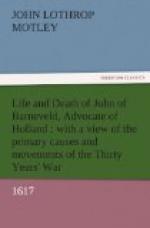Early in the year there was a meeting of the Holland delegation to the States-General, of the state council, and of the magistracy of the Hague, of deputies from the tribunals, and of all the nobles resident in the capital. They sent for Maurice and asked his opinion as to the alarming situation of affairs. He called for the register-books of the States of Holland, and turning back to the pages on which was recorded his accession to the stadholderate soon after his father’s murder, ordered the oath then exchanged between himself and the States to be read aloud.
That oath bound them mutually to support the Reformed religion till the last drop of blood in their veins.
“That oath I mean to keep,” said the Stadholder, “so long as I live.”
No one disputed the obligation of all parties to maintain the Reformed religion. But the question was whether the Five Points were inconsistent with the Reformed religion. The contrary was clamorously maintained by most of those present: In the year 1586 this difference in dogma had not arisen, and as the large majority of the people at the Hague, including nearly all those of rank and substance, were of the Remonstrant persuasion, they naturally found it not agreeable to be sent out of the church by a small minority. But Maurice chose to settle the question very summarily. His father had been raised to power by the strict Calvinists, and he meant to stand by those who had always sustained William the Silent. “For this religion my father lost his life, and this religion will I defend,” said he.
“You hold then,” said Barneveld, “that the Almighty has created one child for damnation and another for salvation, and you wish this doctrine to be publicly preached.”
“Did you ever hear any one preach that?” replied the Prince.
“If they don’t preach it, it is their inmost conviction,” said the other. And he proceeded to prove his position by copious citations.
“And suppose our ministers do preach this doctrine, is there anything strange in it, any reason why they should not do so?”
The Advocate expressed his amazement and horror at the idea.
“But does not God know from all eternity who is to be saved and who to be damned; and does He create men for any other end than that to which He from eternity knows they will come?”
And so they enclosed themselves in the eternal circle out of which it was not probable that either the soldier or the statesman would soon find an issue.
“I am no theologian,” said Barneveld at last, breaking off the discussion.
“Neither am I,” said the Stadholder. “So let the parsons come together. Let the Synod assemble and decide the question. Thus we shall get out of all this.”
Next day a deputation of the secessionists waited by appointment on Prince Maurice. They found him in the ancient mediaeval hall of the sovereign counts of Holland, and seated on their old chair of state. He recommended them to use caution and moderation for the present, and to go next Sunday once more to Ryswyk. Afterwards he pledged himself that they should have a church at the Hague, and, if necessary, the Great Church itself.




